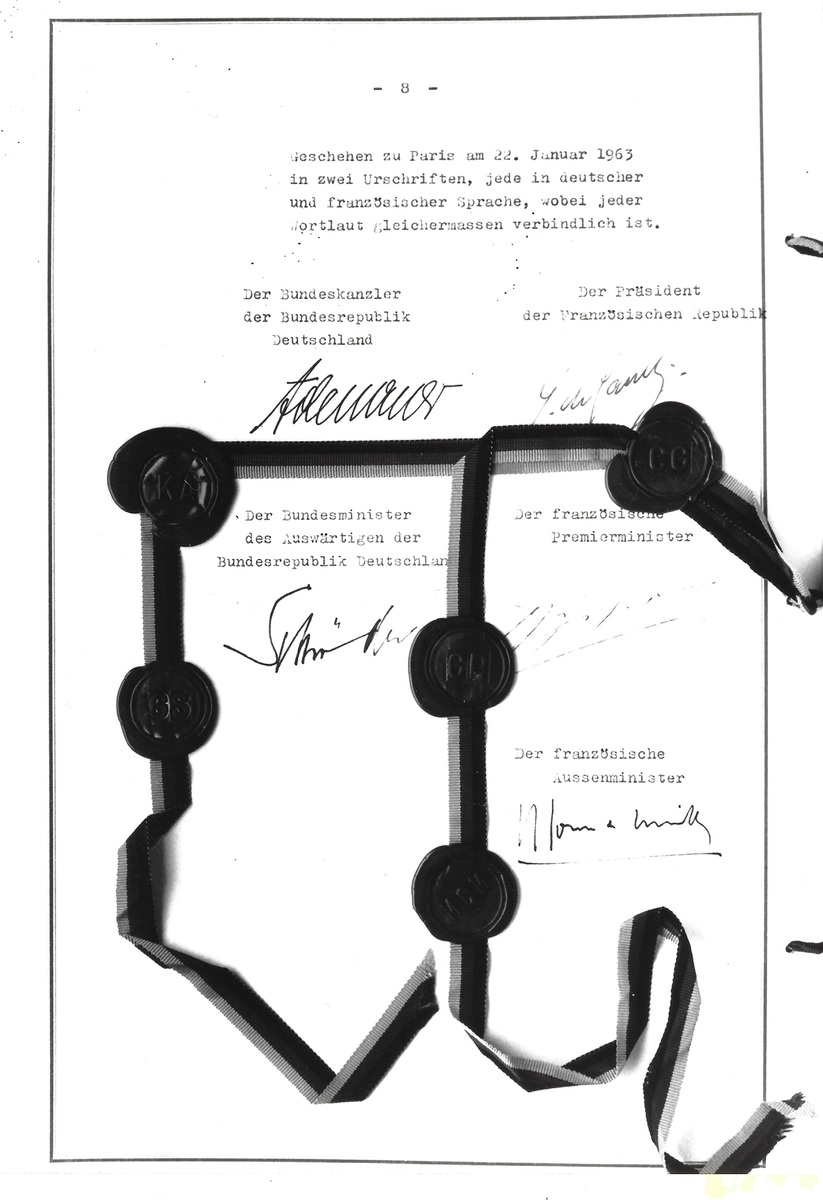Source
Law on the Joint Declaration and on the Treaty from 22. January 1963 between the Federal Republic of Germany and the French Republic on German-French Cooperation from 15. June 1963
Convinced
—that the treaty between the Federal Republic of Germany and the French Republic of 22 January 1963 will deepen and shape the reconciliation and friendship of the German people and the French people;
Recognizing
—that this treaty will not affect the rights and responsibilities that arise from the multilateral agreements concluded by the Federal Republic of Germany;
having resolved
—to use the application of this treaty to further the grand goals that the Federal Republic of Germany, in community with other allied states, has pursued for years and that determine the Federal Republic’s policies:
namely,
the maintenance and consolidation of the association of free peoples, especially the close partnership between Europe and the United States of America,
the realization of the right to self-determination for the German people, and the reestablishment of German unity;
the collective defense within the framework of the North Atlantic Treaty Organization and the integration of the armed forces of those states bound together in this alliance,
the unification of Europe on the path started by the creation of the European Communities, including the United Kingdom and other states willing to accede, and the further strengthening of these Communities;
the reduction of trade barriers through negotiations between the European Economic Community, the United Kingdom, and the United States of America, as well as other countries within the framework of the “General Agreement on Tariffs and Trade”;
conscious
—that a Franco-German co-operation that is guided by these goals will benefit all peoples, serve peace in the world, and thereby simultaneously contribute to the good of the German people and French people,
the Bundestag has passed the following law:
Article 1
The Joint Declaration of the Chancellor of the Federal Republic of Germany and the President of the French Republic signed in Paris on 22 January 1963, and the Treaty signed at the same time between the Federal Republic of Germany and the French Republic on Franco-German co-operation are hereby approved. The Joint Declaration and the Treaty are published below.
Article 2
This law also applies in West Berlin, insofar as the state of Berlin declares the application of this law.
Article 3
(1) This law shall enter into force on the day after its promulgation.
(2) The day on which the Joint Declaration and the Treaty, pursuant to no. 5 of its final provisions, enter into force shall be announced in the Bundesgesetzblatt [Federal Law Gazette].
The constitutional rights of the Bundesrat remain intact.
The abovementioned law is herewith promulgated.
Bonn, June 15, 1963
The Federal President
Lübke
The Federal Chancellor
Adenauer
The Federal Minister of Foreign Affairs
Dr. Schröder
Joint Declaration
The Chancellor of the Federal Republic of Germany Dr. Konrad Adenauer and the President of the French Republic General de Gaulle,
—at the close of the conference held in Paris on 21 and 22 January 1963 and attended on the German side by the Federal Minister of Foreign Affairs, the Federal Minister of Defense and the Federal Minister for Family and Youth Affairs, and on the French side by the Prime Minister, the Foreign Minister, the Armed Forces Minister and the Minister of Education,
—convinced that the reconciliation of the German people and the French people, ending a centuries-old rivalry, constitutes a historic event which profoundly transforms the relations between the two peoples,
—conscious of the solidarity uniting the two peoples from the point of view of both their security and their economic and cultural development,
—aware in particular that young people have recognized this solidarity and are called upon to play a decisive part in the consolidation of Franco-German friendship,
—recognizing that increased co-operation between the two countries constitutes an indispensable stage on the way to a united Europe, which is the aim of the two peoples:
have agreed to the organization and principles of co-operation between the two States as set out in the treaty signed today.
Done at Paris on 22 January 1963 in duplicate in the German and French languages.
The Chancellor of the Federal Republic of Germany
Adenauer
The President of the French Republic
C. de Gaulle
[…]
Source of English translation: Allison Brown for GHDI (Part I) and “Text of the Franco-German Treaty signed in Paris (22nd January 1963),” in Western European Union Assembly-General Affairs Committee: A Retrospective View of the Political Year in Europe 1963. March 1964, p. 29f (Part II).
Source of original German text: “Gesetz zu der Gemeinsamen Erklärung und zu dem Vertrag vom 22. Januar 1963 zwischen der Bundesrepublik Deutschland und der Französischen Republik über die deutsch-französische Zusammenarbeit vom 15. Juni 1963,” Bundesgesetzblatt, 1963, II, pp. 705–06. Available online at: http://www.bgbl.de/xaver/bgbl/start.xav?startbk=Bundesanzeiger_BGBl&jumpTo=bgbl263s0705.pdf
